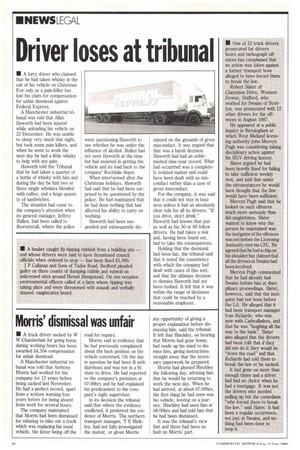Driver loses at tribunal
Page 24

If you've noticed an error in this article please click here to report it so we can fix it.
• A lorry driver who claimed that he had taken whisky in the cab of his vehicle on Christmas Eve only as a pain-killer has lost his claim for compensation for unfair dismissal against Federal Express.
A Manchester industrial tribunal was told that Allan Haworth had been injured while unloading his vehicle on 23 December. He was unable to sleep very much that night, but took some pain killers, and when he went to work the next day he had a little whisky to help with any pain.
Haworth told the Tribunal that he had taken a quarter of a bottle of whisky with him and during the day he had two or three single whiskies blended with coffee, and a large quantity of sandwiches.
The situation had come to the company's attention when its general manager, Jeffrey Bullen, had been called to Rawtenstall, where the police were questioning Haworth to see whether he was under the influence of alcohol. &alien had not seen Haworth at the time but had assisted in getting the vehicle and its load hack to the company' Rochdale depot.
When interviewed after the Christmas holidays. Haworth had said that he had been surprised to be questioned by the police. He had maintained that he had done nothing that had affected his ability to carry on working.
Haworth had been suspended and subsequently dis missed on the grounds of gross misconduct. It was argued that that was a harsh decision. Haworth had had an unblemished nine-year record. What had occurrred was a completely isolated matter and could have been dealt with as misconduct rather than a case of gross misconduct.
For the company, it was said that it could not stay in business unless it had an absolutely clear rule for all its drivers: "If you drive, don't drink." Haworth had known that just as well as his 50 or 60 fellow drivers. He had taken a risk and, having been found out, had to take the consequences.
Holding that the dismissal had been fair, the tribunal said that it noted the consistency with which the company had dealt with cases of this sort, and that the ultimate decision to dismiss Haworth had not been rushed. It felt that it was within the range of decisions that could be reached by a reasonable employer.
















































































































